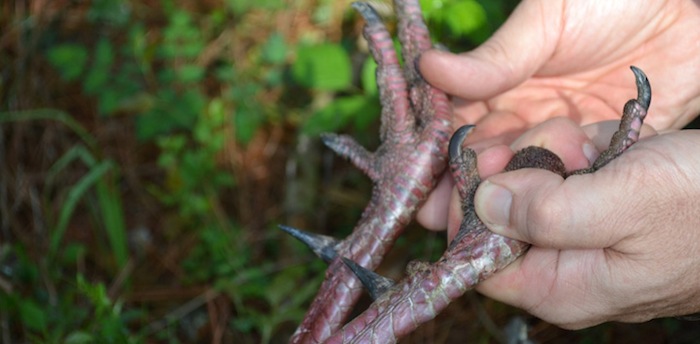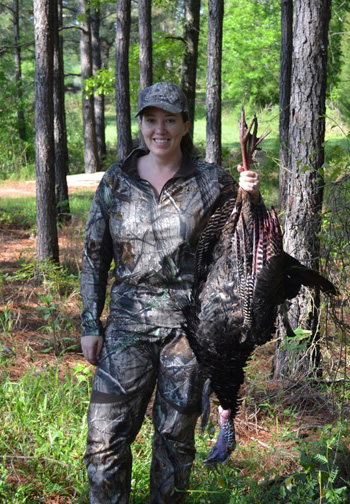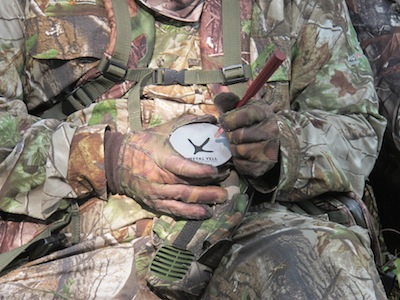 “You know, I don’t think I’ve ever guided another hunter who’s as patient as you,” guide Doug Smelcer of Union Springs, AL, told me as we drove out of the woods. This came as a surprise to me, because as my husband, my mother and any coworker who’s known me more than a few days will attest, patience has never been one of my virtues.
“You know, I don’t think I’ve ever guided another hunter who’s as patient as you,” guide Doug Smelcer of Union Springs, AL, told me as we drove out of the woods. This came as a surprise to me, because as my husband, my mother and any coworker who’s known me more than a few days will attest, patience has never been one of my virtues.
True, we had just completed a four-hour, tailbone-numbing, shoulder-aching, knee-straining sit in the woods, having heard virtually no gobbles all afternoon after we spooked a tom and a few hens off a hillside shortly after lunch. It was agonizing. But what Doug didn’t know is that I wasn’t being patient — I just didn’t know any better. As a relatively new turkey hunter I was taking the “act like you belong” tactic of keeping my mouth shut, trusting the guide to know best and not realizing many turkey hunters would have given up and moved to a new setup long ago.
Back at Master Rack Lodge, the other guides and hunters, who had packed it in earlier in the afternoon, gave us a hard time for staying in one place. They were all run-and-gunners and had covered a lot of territory that day, though we had all come back birdless. “A four-hour sit? Yeah, that sounds like Doug,” one guide chuckled.
It had already been an interesting weekend. Overcast skies on Friday morning yielded gobbles all around us, but no one could get a tom to come within range. Friday afternoon and Saturday morning brought severe thunderstorms and more than five inches of rain. Doug and I ran for our lives that morning after a bolt of lightning struck a tree not 30 yards from our setup just after daylight. I spent the rest of the morning sitting on the porch taking calling lessons from Jason Gordon of Knight & Hale, eventually achieving at least passable skills on the Bloodwood Cutter box call and the Metal Yell friction call. Saturday afternoon was the unproductive four-hour sit, and since everyone else’s hunts had been equally unproductive, we were starting to worry. We had eight hunters, no birds down and one morning left to hunt.
We knew the birds were here. Master Rack Lodge has an 85-90 percent success rate on turkeys, and owner Steve Maxwell had gathered us some of the best guides in the business. He has access to hunt more than 9,000 acres outside Union Springs, in the heart of Alabama’s famed Black Belt Region. So named for its rich soil and abundance and variety of wildlife, the Black Belt is home to more deer and turkeys than most other regions and states can even dream about. Turkey sign are everywhere and the birds were gobbling their heads off. But so far, these seven veteran turkey hunters and one newbie (me) had been unable to connect.
The Final Countdown — Sunday Morning
Knowing that birds were roosting nearby, Doug wanted to head back to what we now referred to as “the lightning field” before dawn Sunday. We set up on the edge of a field, leaning against two pine trees at the bottom of a hill. The rain had finally moved out and we were expecting a sunny morning.
I was not fully prepared for the heart-pounding adrenaline rush I got when gobblers starting sounding off all around us. One was not far away and was answering every call. I was sure we’d be done hunting by 6:45 at this rate, but the tom suddenly shut up and the woods went silent. It was April Fool’s day — was this some kind of sick cosmic joke?
“He’s henned up,” Doug whispered. “We just have to wait him out.” No problem. Most patient hunter ever, remember?
Not long after, we heard a shot in that direction and I was sure someone else had shot my bird.
An hour later, with nothing going on, Doug asked if I wanted to move. I knew the other hunters were traipsing around the woods trying to “make something happen,” but I liked the idea of sitting and waiting, so that’s what we did. I felt committed to the patience strategy by now.
Then it happened. A gobble out in front of us, a couple hundred yards away across a creek. Then another gobble, closer and off to our left. Doug let out a few clucks and purrs and that gobbler closed 100 yards on us in no time flat. He was coming, and fast, but another gobble sounded out to our right. It was not far away and we assumed it was that first bird we had worked at daybreak. He hadn’t been shot after all, and he was finished with his hens and looking for more.
As if I wasn’t having a hard enough time keeping my you-know-what together with three gobblers sounding off at once, two of them definitely coming in and from opposite sides of the field, a hen suddenly exploded in a jealous rage on the hilltop above us. It was sit-still-and-shut-up time. Where do I look? How do I turn my head without that hen spotting us? Can they hear my heart beating as loudly as I can? I was sure both birds would come in at the same time and one would bust me when I made a move on the other.
 You know how your brain kind of goes on autopilot and puts the pieces together for you at the moment of truth? That’s what happened when that bird to the right stepped out into the clearing 40 yards away. I happened to be staring in exactly that direction and used the cover of a bush to ease the gun into position. Face on the stock, settle the sights, wait for his head to come up, deep breath, squeeze the trigger — it all happened without consciously thinking about it, and my first turkey lay flopping in the field.
You know how your brain kind of goes on autopilot and puts the pieces together for you at the moment of truth? That’s what happened when that bird to the right stepped out into the clearing 40 yards away. I happened to be staring in exactly that direction and used the cover of a bush to ease the gun into position. Face on the stock, settle the sights, wait for his head to come up, deep breath, squeeze the trigger — it all happened without consciously thinking about it, and my first turkey lay flopping in the field.
The ensuing scuffle to make sure he was down for good left more tail feathers on the ground than still attached to the bird, but when the dust settled, we measured out a 9-inch beard and spurs just shy of an inch and a quarter. I couldn’t have been happier with my Black Belt tom.
“You want me to carry him out for you?” Doug asked.
I heaved the bird over my shoulder. “Not a chance.”
Alabama Black Belt Adventures
Alabama Black Belt Adventures (ALBBA) is a non-profit organization committed to promoting outdoor recreation and tourism opportunities in the state’s 23-county Black Belt region, which extends across the state and lies below the Appalachian foothills and above the Coastal Plain. Widely known for its excellent hunting and fishing opportunities, Alabama’s Black Belt also is the site of pivotal civil rights events that forever changed America. The Black Belt region is also rich in other historical and cultural destinations, ranging from elegant antebellum homes to fun-filled river festivals and fascinating museums.
Alabama’s Black Belt gets its name from the dirt — a rich, dark loamy soil whose high fertility produces nutrient-rich vegetation. That, in turn, serves as high-quality habitat for numerous wildlife species, including whitetailed deer. Sportsmen and wildlife managers recognize it as an area that consistently produces great weights and excellent antler characteristics. The Black Belt produces record bucks on a regular basis.
The Black Belt also features superb ground cover and terrain for quail, dove, turkey and duck hunting. To complement the Black Belt’s great hunting, the region’s rivers, ponds and streams lend themselves to bass, crappie and bream fishing.
With more than 50 lodges throughout the Black Belt offering world-class hunting for deer, turkey, quail, dove and more, Alabama Black Belt Adventures has all you need to find the perfect place to plan a hunt with your buddy, a corporate group retreat, or an adventuresome weekend with your family. And the fishing is almost year-round for lunker bass and crappie. When you consider the many historical and cultural attractions also in the area, you’ll realize that the Black Belt has something for everybody.







